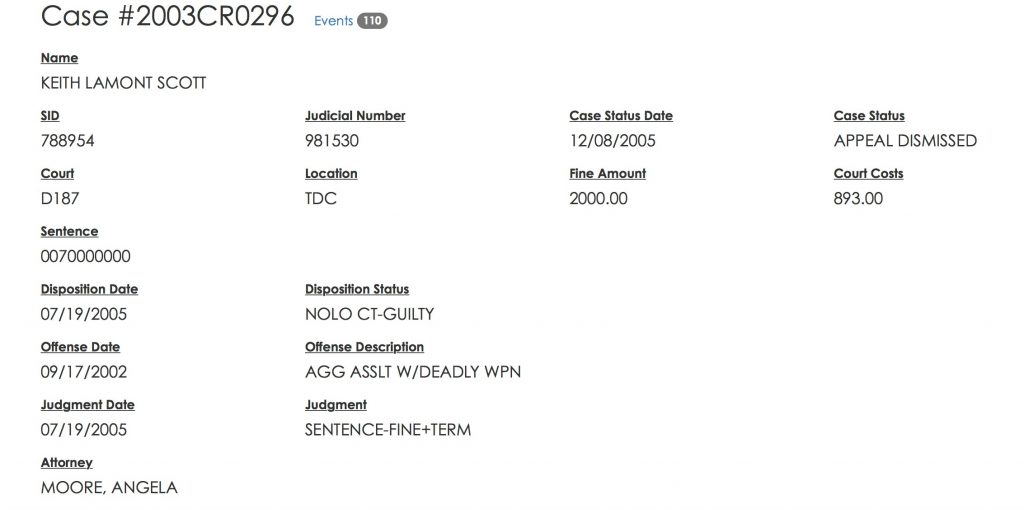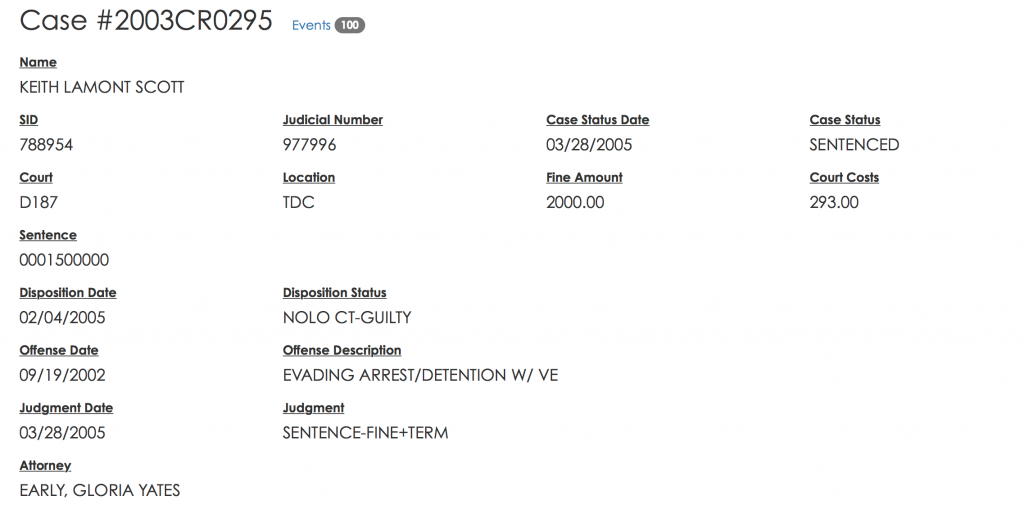
The black man shot and killed by a black police officer in Charlotte, N.C. Tuesday was a felon who had gone to prison for seven years, making it illegal for him to possess a firearm.
According to records from Bexar County, Texas, Keith Lamont Scott was convicted of aggravated assault with a deadly weapon in July 2005 and sentenced to seven years in prison. In relation to that case, he was charged and found guilty of evading arrest. He was also charged with unlawfully carrying a weapon, reckless driving, and assaulting his wife, but these charges were later dismissed.
Here is information about the case from the Bexar County Clerk of Court, followed by the list of other charges in Texas:



As reported in the Charlotte Observer (but buried at the very bottom of a lengthy post), Scott also has a criminal history in North Carolina and South Carolina, dating back to 1992.
A public records search shows Scott was convicted in April 2004 of a misdemeanor assault with a deadly weapon charge in Mecklenburg County. Other charges stemming from that date were dismissed: felony assault with a deadly weapon with intent to kill, and the misdemeanors assault on a child under 12, assault on a female, and communicating threats.
In 1992, Scott was charged in Charleston County, S.C., with several different crimes on different dates, including carrying a concealed weapon (not a gun), simple assault, and contributing to the delinquency of a minor. He pleaded guilty to all charges. Scott also was charged with aggravated assault in 1992 and assault with intent to kill in 1995. Both charges were reduced, but the disposition of the cases is unclear.
Scott’s criminal record is significant in light of police reports that he was carrying a gun at the time of his fatal encounter with a police officer this week. Under federal law (18 U.S.C 922(g)(1-9)), it is illegal for anyone who has been “convicted in any court of a crime punishable by imprisonment for a term exceeding one year” to possess a firearm.
The Charlotte-Mecklenburg Police chief told reporters Wednesday that officers have said Scott had a handgun when he got out of his car. When he refused to drop the weapon, that’s when officers shot him.
“It’s time to change the narrative, because I can tell you from the facts that the story’s a little bit different as to how it’s been portrayed so far, especially through social media,” Chief Kerr Putney said.
Video footage from a dash-cam of the incident was made available to Scott’s family Wednesday. After viewing the video, the family said they wanted the videos released to the public immediately. In an emailed statement, the family’s attorney, Justin Bamberg, said, “After watching the videos, the family again has more questions than answers.”
Bamberg said it was impossible to see what was in Scott’s hands, and that “he was slowly walking backwards” when he was shot.
Despite reports from sources within the department that say the video shows Scott with a gun, Putney also said he can’t see Scott’s hands well enough to determine whether he was holding a weapon.
“The angle in which he’s standing, I can’t see his hands,” Putney told CNN. “Therefore, I can’t see a weapon in his hands or him pointing a weapon that would be in his hands. I can’t see, based on the angle, that definitive piece of visual evidence that I need.”
However, Putney said, a gun was found at the scene beside Scott.
“We have various statements that he had the weapon, that he wouldn’t drop it, after repeated verbal commands,” Putney said. “At the incident, there is a weapon recovered right there in close proximity to the subject.”
When Megyn Kelly of Fox News asked Putney Thursday night if he had “any doubt” that Scott had a gun, the police chief said even though it would be good to have video evidence, sometimes that’s not enough.
“There’s a lot of other evidence that I can’t speak to further,” he said. “The State Bureau of Investigations, an independent investigative body, has taken over. I really can’t speak to the investigation further, but there’s a lot of other evidence that gives us a great deal of support and comfort that the version that you heard from us before is supported by the evidence. . . . that version is still very much accurate.”
When Kelly asked him about fingerprints on the gun and whether it was registered to Scott, Putney said that’s all very relevant, but he can’t speak about it now with the ongoing investigation.
Having a criminal record like Scott’s doesn’t give police officers license to shoot. However, the facts about Scott’s criminal history cast doubt on the narrative that he was a gentle family man who was just sitting in his car reading a book.









